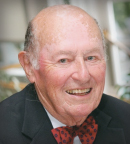ASCO is saddened by the passing of Irwin H. Krakoff, MD, on August 9, 2023, at the age of 100. He is remembered as one of the founding fathers of modern chemotherapy.
Dr. Krakoff was born on July 20, 1923, in Columbus, Ohio. He attended The Ohio State University, earning his bachelor’s degree in 1943 and his medical degree in 1947. He completed his internship at Mount Sinai Hospital, Cleveland, and his residency at Boston City Hospital. But he put his medical career on hold to serve in the U.S. Navy during World War II.

Irwin H. Krakoff, MD
On his return in 1953, Dr. Krakoff became a research fellow at Memorial Sloan Kettering Cancer Center (MSK) and eventually led the Chemotherapy Program, Medical Oncology Service, and Department of Medicine. It was at MSK that he researched purine metabolism and new cancer drugs focused on patients with leukemia. Specifically, he identified the role of allopurinol in preventing urate nephropathy, a common complication when treating patients with leukemia and lymphoma.
In 1976, Dr. Krakoff left MSK to found and direct the Vermont Cancer Center at the University of Vermont.
“Bringing state-of-the art cancer care to a fairly rural population and gaining NCI [National Cancer Institute] designation for that cancer center was something that my team there and I were very proud of,” Dr. Krakoff said in a 2015 interview with ASCO Daily News.
His last appointment was as Head of the Division of Medicine at the MD Anderson Cancer Center in 1983.
In 1993, coinciding with his retirement, ASCO honored Dr. Krakoff with the David A. Karnofsky Memorial Lecture and Award, the Society’s highest scientific honor. In his lecture, “Progress and Prospects in Cancer Treatment: The Karnofsky Legacy,” he highlighted important developments in cancer treatment since 1950 and stressed the importance of new cancer drugs.
“It is now within our grasp to inhibit the development of cancer at a point well before its clinical appearance and possibly before the development of positive biomarkers; when sufficiently nontoxic drugs are developed, they can be applied to large populations, not just those at the highest risk. The exciting biotechnology that surrounds us is more likely, I think, to block the development of cancer than to melt large tumors,” Dr. Krakoff said during his presentation.
He ended his lecture with this simple directive to other oncology professionals: “It is our responsibility to use that knowledge to treat and prevent clinical cancer and to ensure that laboratory scientists address clinically important problems.”
See The Cancer Letter and the Savannah Morning News, for more about Dr. Krakoff’s life and legacy. Read his Karnofsky Award Lecture in the Journal of Clinical Oncology.
Originally published in ASCO Connection. © American Society of Clinical Oncology. ASCO Connection, August 15, 2023. All rights reserved.

